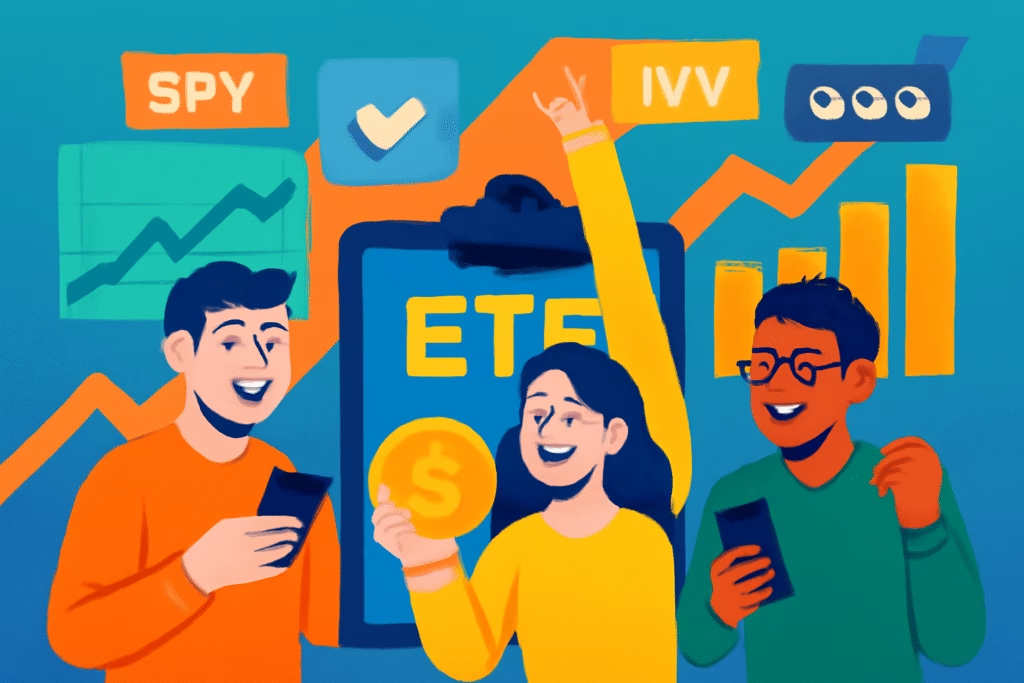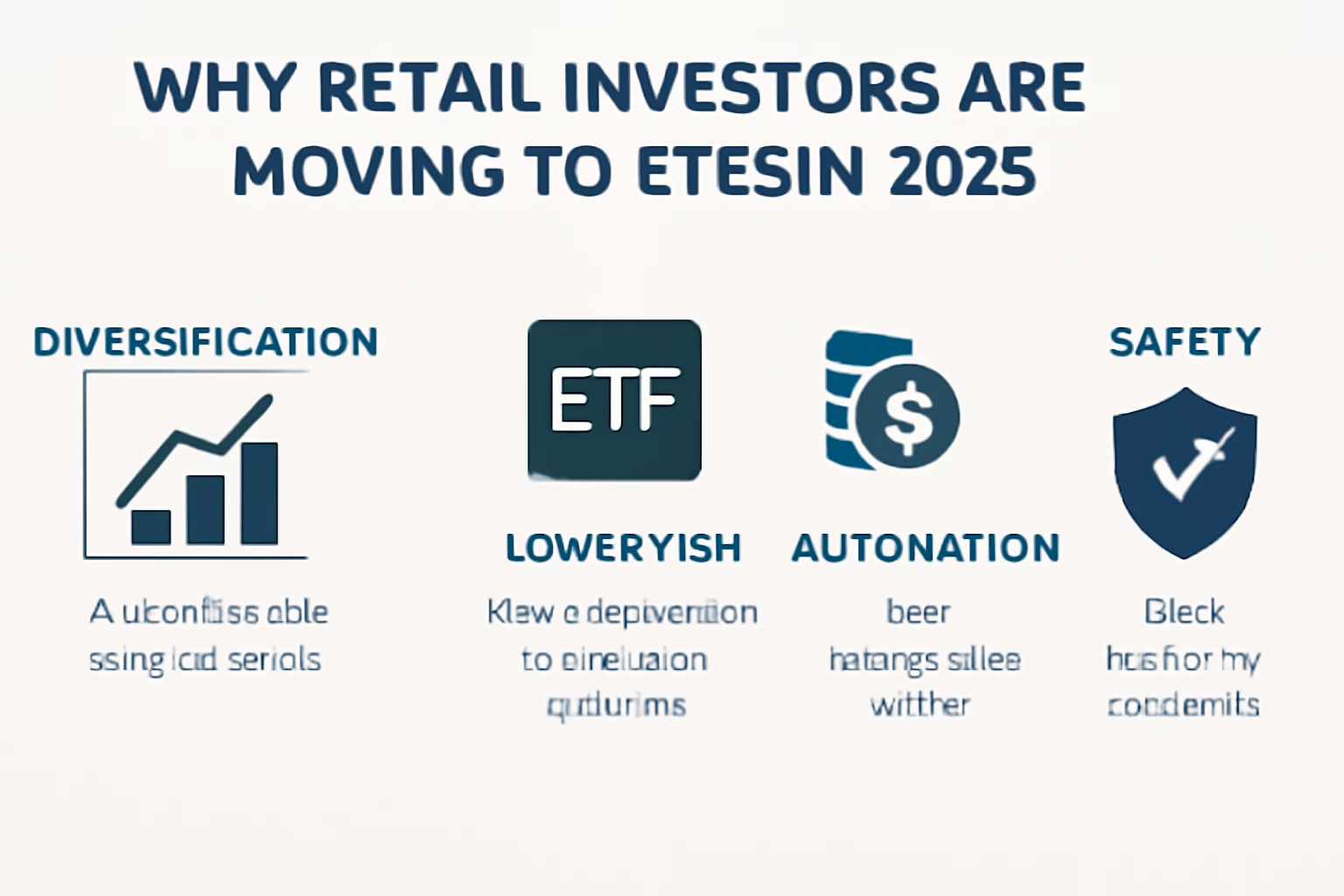The world of investing is quickly changing, and in 2025, more and more retail investors are moving to ETFs. This big shift is being driven by a desire for stability, safety, and smarter ways to build wealth. Are ETFs really safer than stocks in 2025? In this comprehensive guide, you’ll discover why retail investors are moving to ETFs, how this trend can protect your money, and step-by-step strategies to benefit from this movement.

What Are ETFs, and Why Are They Gaining Traction in 2025?
ETFs, or exchange-traded funds, are collections of different assets like stocks, bonds, or commodities bundled into a single, tradeable fund. In 2025, ETFs have become the talk of financial news—and for good reason. The biggest driver is the search for safety and predictable growth, especially among new retail investors who have seen the wild swings in individual stock prices over the recent years.
Problem #1: Individual Stocks Are Risky, Volatile, and Stressful
The stock market in 2025 continues to move unpredictably, with sudden crashes, “meme stock” bubbles, and trending news sending prices soaring or plunging in a day. For most retail investors, picking winning stocks is confusing, overwhelming, and can lead to sleepless nights. Every portfolio manager warns: most individual investors lose money trying to time the market or pick the next big stock.
Solution? This is why retail investors are moving to ETFs—because ETFs spread your money across dozens or even hundreds of different companies, dramatically reducing risk. When you own an ETF, even if one stock crashes, your whole portfolio isn’t destroyed.
Problem #2: Lack of Time and Knowledge
Let’s be honest—do you have hours each week to research companies, read earnings reports, and stay on top of global news just to manage a few stocks? Most people don’t. This knowledge gap means many end up buying stocks “because everyone else is,” or relying on unreliable social media tips.
Here’s why retail investors are moving to ETFs: because ETFs are managed by professional fund managers and track proven indexes like the Sensex, Nifty, or NASDAQ. You outsource the research to the experts, and simply track the index’s growth.
How ETFs Make Investing Safer Than Picking Stocks
1. Built-In Diversification
When you buy a single stock, you’re tied to the fate of just one business. But buying an ETF automatically gives you exposure to a wide range of companies, industries, and sectors. For example, the Nifty 50 ETF includes India’s top 50 companies. This built-in diversification is a chief reason why retail investors are moving to ETFs.bajajfinserv+2
2. Lower Costs = Higher Returns
Active stock trading means paying brokerage, fees, and commissions over and over. Most ETFs have ultra-low expense ratios because they simply track an index rather than try to “beat” it. According to Kotak Securities and State Street, in 2025, some ETFs charge as little as 0.05% per year, compared to 1-2% for mutual funds and even higher costs for frequent stock trades.
3. Real-Time Liquidity
Unlike mutual funds, you can buy or sell ETFs on the stock exchange at any moment during trading hours—just like regular shares. This flexibility gives you control in volatile markets, and is another key reason why retail investors are moving to ETFs.
4. Transparency
Most ETFs publish their full holdings daily, so you always know exactly what assets you own—unlike many mutual funds, which often disclose portfolios only monthly or quarterly. Transparency increases safety and trust, explaining why retail investors are moving to ETFs for more peace of mind.deloitte+1
5. Tax Advantages
ETFs are structured to be more tax-efficient than both stocks and mutual funds. In 2025, thanks to new government policies, most index ETFs offer lower capital gains tax liability, especially for investors who hold for the long term. This tax benefit is a powerful factor why retail investors are moving to ETFs.
Technology Is Empowering Investors
Easy-to-use apps and digital brokers are making ETF investing simpler and cheaper than ever. In 2025, younger investors especially are opening ETF savings plans and setting up recurring investments without needing to buy or research individual stocks. The low barriers and convenience are yet another reason why retail investors are moving to ETFs.
Problem #3: Emotional Investing Destroys Wealth
Human psychology is a major enemy of successful investing. We panic-sell during dips and buy high when markets are euphoric. ETFs promote a disciplined, “set it and forget it” approach. With automatic monthly investments into an ETF, you make emotionless, regular contributions and benefit from rupee cost averaging.
This automated, hands-off approach is why retail investors are moving to ETFs in 2025.

The Big Picture: ETFs Help Build Long-Term Wealth Safely
ETFs are now being hailed as the modern investment solution for building long-term wealth. Here are the main reasons why retail investors are moving to ETFs and staying invested for years:
- Wider Access: No minimum investment needed; you can buy even a single unit of most ETFs.
- All-Weather Strategy: You’re prepared for market swings, sector booms and busts, and even global crises.
- Custom Portfolios: Choose from sector-specific, global, or thematic ETFs to match your goals.
As a result, more platforms, financial advisors, and even “finfluencers” are showing why retail investors are moving to ETFs as a core portfolio strategy.
Should You Buy the New BlackRock S&P 500 ETF Options?
Common Questions: Why Retail Investors Are Moving to ETFs
Are ETFs truly safer than stocks?
Yes, for most beginners and even advanced investors, ETFs offer broader risk management, built-in diversification, and less temptation for risky trading.
Can I lose money in ETFs?
While ETFs are generally safer, they still follow the markets. If the overall stock market falls, your ETF may decline. However, the loss is usually less severe than with one or two individual losing stocks.
Do ETFs work for all goals—retirement, education, wealth building?
Absolutely. You can use ETFs for long-term SIPs, short-term trading, or thematic plays like gold, international markets, or technology trends.
Are there any drawbacks?
Some sector or thematic ETFs can be less liquid, and not every ETF guarantees returns. As always, read the factsheet and check expense ratios.
How to Start: A Step-by-Step Guide for Retail Investors Moving to ETFs
- Open a trading account with a broker or app that offers ETF investing.
- Research your target ETF—prefer those tracking large indexes for core holdings.
- Start small—buy even one unit to learn how it works.
- Set up automatic investments each month into your chosen ETF.
- Review your portfolio yearly, not daily. The less you “tinker,” the better.
- Reinvest dividends for even stronger long-term growth.
The Future: Why Retail Investors Are Moving to ETFs in 2025 and Beyond
Trends suggest that ETF adoption will only accelerate. Retail flows into ETFs in Europe and India have doubled since 2020, with new investors prioritizing safety, ease, and steady growth over speculation. In the next decade, the average core portfolio will have 50-70% in various ETFs.statestreet+1
If you’re wondering why retail investors are moving to ETFs—remember: it’s about reducing risk, simplifying life, and letting your money grow with the market, not against it.
Actionable Takeaways
- Use ETFs for the core of your portfolio, with stocks as a small “satellite” for higher risk/reward.
- Prioritize low-cost, broad-market ETFs for maximum safety and growth.
- Lean into automation: SIPs or recurring buys remove emotion and maximize returns.
- Stay educated—understand what’s in your ETF, and keep up with market news, but avoid reactionary trading.
- Remember—this is why retail investors are moving to ETFs in 2025!
In summary: The shift to ETFs is changing the investing game. By spreading risk, lowering costs, and empowering small investors, these funds are the undisputed choice for a safe, smart, and sustainable path to wealth in 2025. So, join the movement—and see firsthand why retail investors are moving to ETFs for a brighter financial future.
